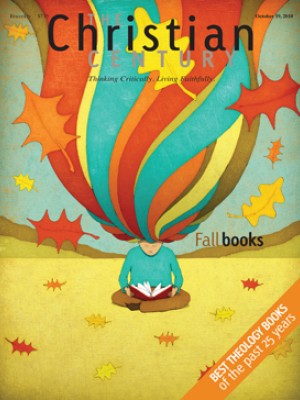Mormons part of the mainstream conversation
Mormons have been making headlines across the nation lately—from HBO's Big Love to California's Proposition 8, from American Idol wannabe David Archuleta to Twilight author Stephenie Meyer, from Senate majority leader Harry Reid to conservative icon Glenn Beck.
Church spokesman Michael Otterson writes essays for the Washington Post. Mormonism is discussed in an important new book, American Grace: How Religion Divides and Unites Us. And two more universities are poised to launch courses in Mormon studies.
Read our latest issue or browse back issues.
It's all given the Church of Jesus Christ of Latter-day Saints a glimpse of what it's like to play in religion's big leagues. Indeed, says Mormon blogger Jana Riess in Cincinnati, Mormonism is becoming part of the "mainstream national conversation in a way that it wasn't ten years ago."
Such visibility could partially explain why the church-owned Deseret News laid off nearly half of its Salt Lake City staff and plans to tap a stable of "correspondents" as it charts a new future beyond Utah's Wasatch Range.
The more prominent LDS profile also may have helped propel its flagship school, Brigham Young University, out of the Mountain West Conference. They have signed a football broadcasting deal with ESPN, with a promise to fill stadiums across the country with true-blue BYU fans.
Taken together, these moves suggest to American religion scholar Jan Shipps that Mormon leaders are saying to themselves, "The world is changing, and we are going to change with it." The church is looking toward a stage "that is much grander than the Intermountain West," says Shipps, an eminent non-Mormon historian of Mormonism. "And especially grander than Utah."
Is Mormonism big enough and secure enough to rise on the respectability ladder? Will far-flung readers flock to a revamped church-owned newspaper? Can BYU football score the same kind of national cachet as Notre Dame's?
Clark Gilbert, CEO of the Deseret News, is confident that the 160-year-old paper can lead the country's journalistic revolution and increase the church's status at the same time. "We are not just a local paper; we have national reach and influence," Gilbert recently told Doug Fabrizio, host of KUER's RadioWest. "People read us all over the world."
Brigham Young launched the Deseret News in 1850 to report the news from a Mormon perspective. Since then, the Mormon diaspora has looked to the paper for coverage of their spiritual home away from home.
"I think Mormons who have never lived in Utah often have a very intense desire to be part of Mormon culture, which they perceive as emanating from Utah," said Kristine Haglund, editor of Dialogue: A Journal of Mormon Thought, in an e-mail from Boston.
She wonders, though, about the paper's decision to write about national issues from an LDS point of view. "It's not clear to me that there's anything particularly Mormon about most Mormons' Fox News-branded conservatism," Haglund said. "The Deseret News may be aiming for the forehead of the national giant with a very small slingshot and some smallish rocks of Mormon tribalism."
Kaimi Wenger, a Mormon lawyer and blogger in southern California, said the desire for increased exposure conflicts with the church's need for a "correlated message." Wenger added: "Mormons want to be taken seriously and accepted on their own terms, while, at the same time, they want tight message control so they can avoid difficult, complicated and possibly derailing conversations about polygamy and other touchy subjects."
Likewise, Steve Evans, a Mormon lawyer in Seattle who founded the popular blog bycommonconsent.com in 2004, had his doubts. He gets most Mormon news directly from the church's website and sees many Deseret News articles as merely "devotional" and lacking an investigative journalism drive.
Regardless of whether BYU and the Deseret News expand their public impact, the Mormon church can never go back to being a little parochial enterprise, says Utah State University historian Philip Barlow, especially when universities are treating Mormonism as a serious course of study.
"We are important enough to invite this kind of scrutiny," he said, "and rooted enough to endure it." —via RNS, the Salt Lake Tribune






